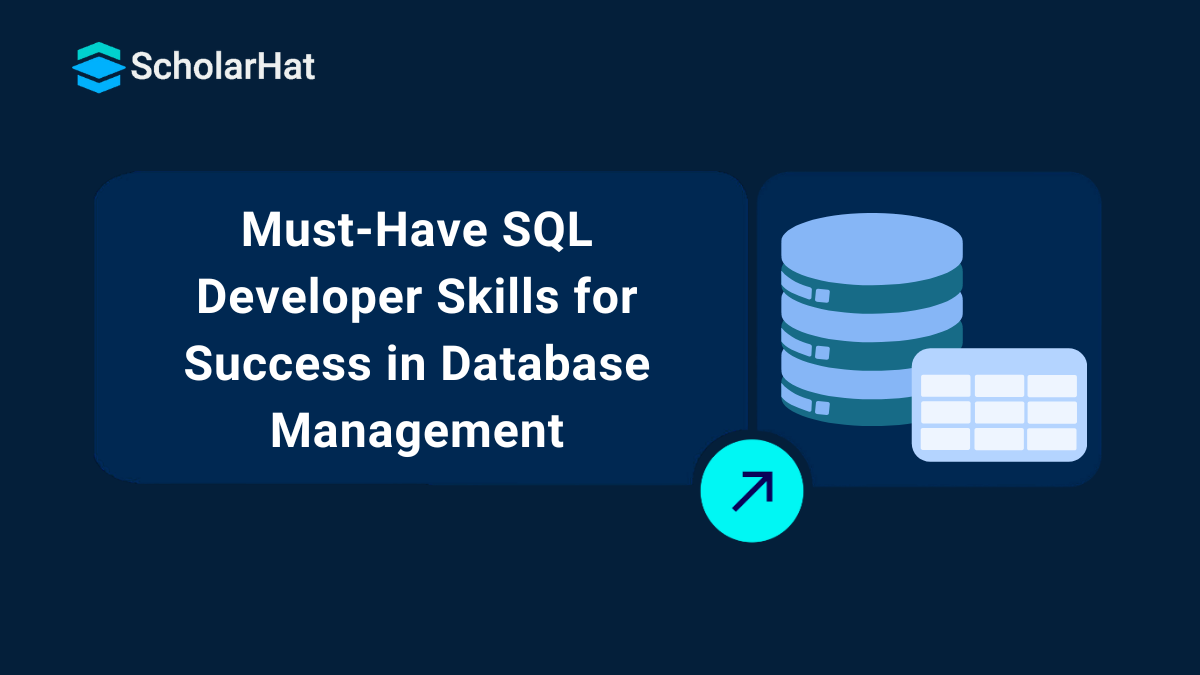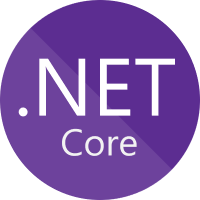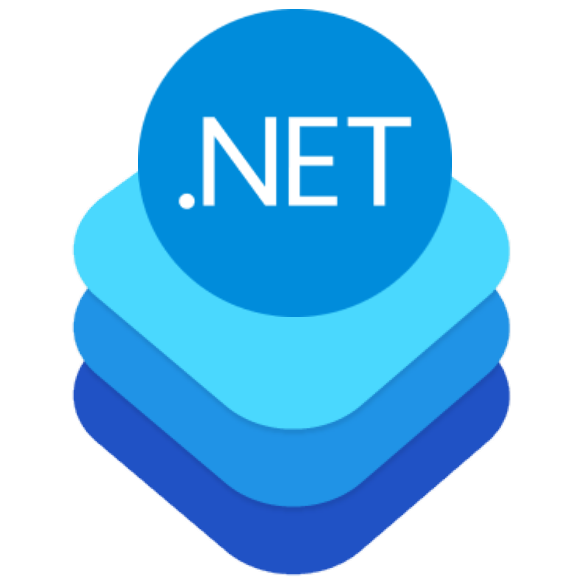Top SQL Developer Skills You Need to Master in 2025
SQL developer skills
Are you looking to level up your SQL skills? As an SQL Developer, your expertise is vital for managing databases, writing efficient queries, and ensuring data flow seamlessly across systems. It’s not just about knowing SQL syntax; you need problem-solving skills, attention to detail, and a solid understanding of SQL Server tools and features.What do SQL Developers do?
SQL developers play a key role in creating and managing databases that store and organize data. You design efficient queries, ensure the security and integrity of data, and optimize database performance for fast retrieval. Have you ever wondered how websites or apps access data instantly? That's thanks to SQL developers, who structure and manage databases to ensure everything runs seamlessly. You also troubleshoot issues and work closely with other teams to improve data systems and processes.
Read More - SQL Interview Questions And Answers
SQL Developer Salary and Job Outlook
If you’re considering a career as an SQL developer, it’s natural to wonder about the salary and job prospects. Here’s what you need to know!
Average Salary
As of October 2024, the average annual salary for an SQL developer is $95,781 (approximately ₹79,00,000 per year in India, depending on the exchange rate), according to Glassdoor. Your salary can vary depending on factors such as your experience level, the industry you work in, and your location. For example:
- Entry-level SQL developers in the US can expect to earn around $60,000 to $70,000 (₹49,00,000 to ₹57,00,000 in India).
- Mid-level developers often earn between $80,000 to $100,000 (₹66,00,000 to ₹83,00,000 in India).
- Senior SQL developers with several years of experience can make over $120,000 (₹99,00,000 or more in India).
Job Outlook
The demand for SQL developers is strong and growing. The US Bureau of Labor Statistics reports a 17% job growth rate for software developers between 2023 and 2033, which is much faster than the average growth rate for all jobs. Why is this field growing so quickly?
- Increased reliance on data-driven decision-making in businesses.
- The rising popularity of cloud computing and big data.
- Expanding industries like e-commerce, healthcare, and finance require robust database management.
What Does This Mean for You?
If you have strong SQL skills and a passion for working with data, this is an excellent time to pursue a career as an SQL developer. With competitive salaries in both the US and India and growing job opportunities, you can build a stable and rewarding career in this field.
What Skills Should a SQL Developer Have?
As an SQL developer, your technical skills are your foundation. Do you know how to optimize your database performance and write efficient queries? Let’s explore the core skills you need to succeed.
1. Proficiency in SQL
To be a great SQL developer, you need to master SQL syntax. This includes understanding DDL (Data Definition Language), DML (Data Manipulation Language), and DCL (Data Control Language) commands. Have you ever created tables, inserted data, or controlled access permissions in a database? That’s where your SQL skills come into play.
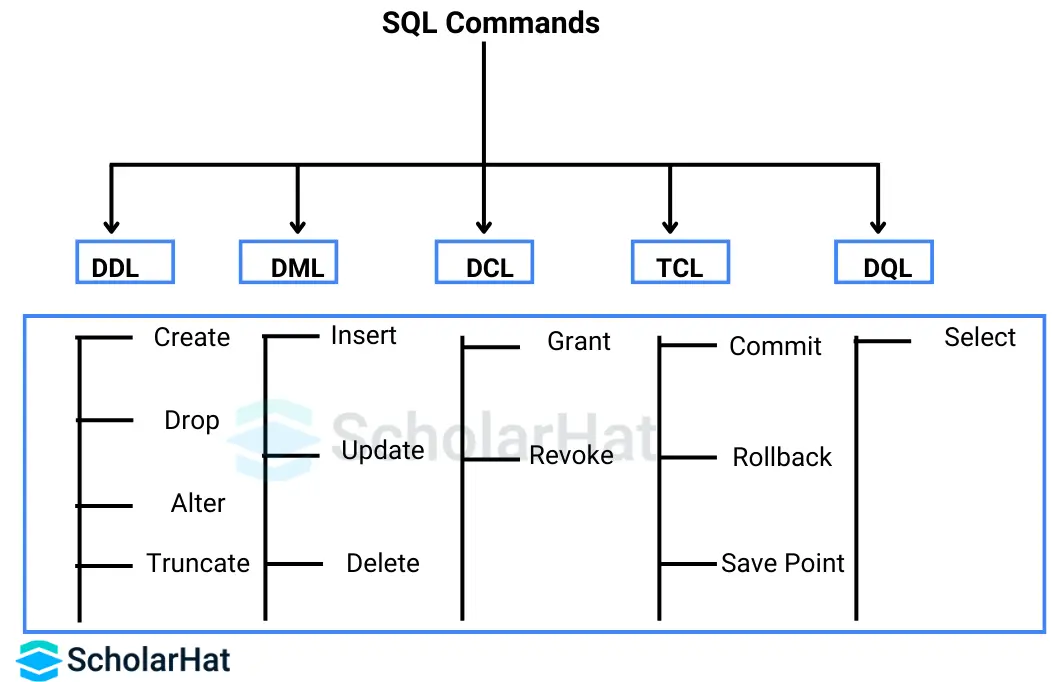
| Read More: Basics of SQL Commands |
2. Database Design
A strong SQL developer knows how to structure a database efficiently. You’ll need to understand normalization (organizing data to reduce redundancy) and denormalization (sometimes adding redundancy for performance). Do you know how to create schemas that reflect real-world systems? That’s a crucial part of your job.
3. Query Writing and Optimization
Writing queries that fetch data quickly and efficiently is key. You’ll need to craft optimized queries that not only give you the right results but also run smoothly. Ever struggled with slow database queries? SQL developers like you work on optimizing those, making sure the performance is top-notch.
| Read More: SQL Queries Interview Questions and Answers |
4. Knowledge of SQL Server
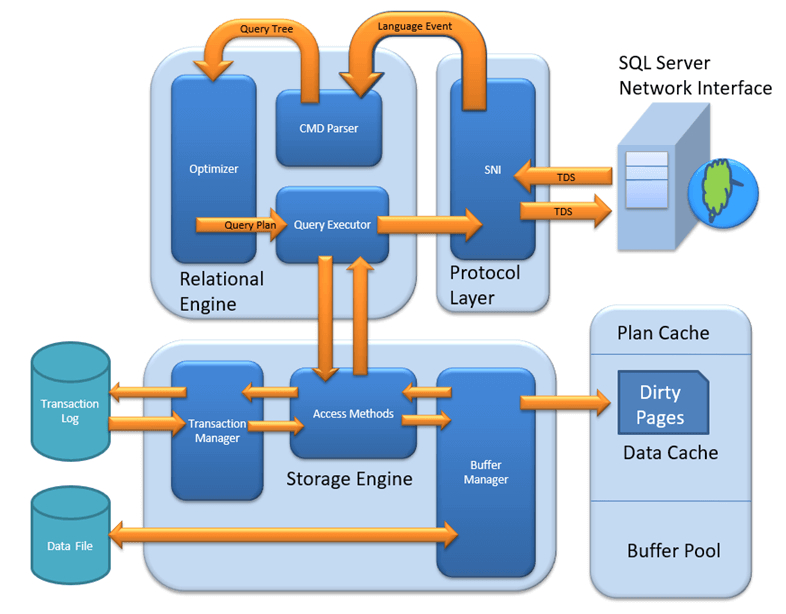
Being familiar with SQL Server, SQL Server Architecture, SQL Server Management Studio (SSMS), and Azure SQL Server is a must for any SQL developer. Have you ever worked with these tools to manage your databases? They allow you to create, modify, and query databases, all in a user-friendly environment.
| Read More: Clear List of Recent SQL Server Connections from SQL Server Management Studio |
5. Indexing and Query Performance Tuning
To improve the speed of your queries, you must master indexing and query performance tuning. Have you ever wondered why some queries are slow? Well, creating the right indexes and tuning queries can drastically speed up data retrieval and execution times.
| Read More: Tips to Improve SQL Server Database Design and Performance |
6. Stored Procedures and Functions
SQL developers often write reusable, modular code in the form of stored procedures and functions. These automate tasks and improve maintainability. Do you enjoy making your code more efficient and reusable? That's what stored procedures and functions help with.
| Read More: Difference Between Stored Procedure and Function in SQL Server |
7. Data Types and Conversions
Understanding data types and how to convert them effectively is essential for any SQL developer.You’ll need to work with various types likeintegers,strings, anddatesand know when and how to convert between them.Have you ever had to handle different data types in your queries? It’s an important part of ensuring accurate data processing.
| Read More: Get Field Name, Data Type, and Size of Database Table in SQL Server |
SQL Developer Advanced Technical Skills
Mastering advanced technical skills takes your expertise to the next level. Are you ready to tackle complex queries and big data challenges? Let’s dive into what you need to excel.
8. Complex Joins and Subqueries
Mastering advanced query techniques like complex joins and subqueries is crucial for handling multiple tables and intricate conditions. Have you ever needed to fetch data from multiple tables with specific criteria? That’s where these advanced SQL skills come into play.
| Read More: Different Types of SQL Joins |
9. ETL Processes
Knowledge of Extract, Transform, Load (ETL) processes and tools like SQL Server Integration Services (SSIS) is essential for moving and transforming data. Do you work with data pipelines to ensure clean and organized data for your systems? This skill will make it seamless.
| Read More: Azure Pipelines |
10. Advanced SQL Server Tools
Using tools like SQL Server Profiler, Query Analyzer, and other advanced utilities helps you debug and fine-tune your database. Have you explored these tools to optimize query performance or troubleshoot issues? They’re a must-have for advanced SQL developers.
11. Data Modeling and Entity-Relationship Diagrams
Creating and understanding Entity-Relationship Diagrams (ERDs) is vital for implementing efficient database designs. Do you map out data relationships before building your database? It ensures a solid foundation for your system.
12. Working with Big Data Technologies
Familiarity with big data technologies like NoSQL databases, Hadoop, and data lakes is increasingly important. Are you handling large datasets and looking to integrate these tools? They’re great for managing and analyzing big data efficiently.
| Read More: What is MongoDB and Why to Use It |
13. Security and Compliance
Ensuring data security through encryption, role-based access, and compliance with regulations like GDPR is essential. Do you prioritize keeping your data safe and compliant? It’s critical for maintaining trust and meeting legal requirements.
| Read More: Security Architecture in Cloud Computing |
SQL Developer Soft Skills
Soft skills help you stand out as an SQL developer. Do you communicate effectively and collaborate well with teams? Let’s see how these skills boost your career.
14. Problem-Solving
Having strong problem-solving skills is crucial for a SQL developer. You’ll need to troubleshoot issues, fix errors, and optimize queries to improve performance. Do you enjoy finding creative solutions to technical challenges?
15. Attention to Detail
Attention to detail ensures your data remains accurate, your queries are error-free, and the data integrity stays intact. Have you ever caught a small mistake that could have caused big issues? That’s the power of being detail-oriented.
| Read More: Transaction in DBMS |
16. Analytical Thinking
Breaking down complex problems into smaller, manageable parts is what analytical thinking is all about. Do you enjoy analyzing data structures and finding ways to improve processes? It’s a vital skill for a SQL developer.
17. Communication Skills
As a SQL developer, you’ll often need to explain technical concepts to non-technical stakeholders. Do you find it easy to translate complex technical ideas into simple terms? Effective communication builds bridges in any team.
18. Time Management
Managing multiple projects and meeting deadlines requires excellent time management. Do you prioritize tasks to stay on top of your work? It’s an essential skill to balance workloads efficiently.
19. Team Collaboration
Working with other developers, business analysts, and stakeholders requires strong team collaboration. Are you someone who enjoys brainstorming and sharing ideas? Collaboration ensures smooth project execution.
20. Continuous Learning
Keeping up with the latest SQL technologies, tools, and best practices shows your dedication to continuous learning. Are you curious about new ways to improve your skills? Staying updated helps you stay competitive in your field.
How to Become a SQL Developer?
Are you thinking about becoming an SQL developer? It’s a fantastic career choice, especially if you love working with data and solving real-world problems. To get there, you need the right mix of education, experience, and certifications. Let’s break it down step by step!
1. Earn a Degree
A strong educational background can set you apart. While some positions may accept a high school diploma, most employers prefer candidates with a bachelor's degree in fields like computer science, data analytics, data management, mathematics, engineering, or statistics.
If you’re aiming for advanced roles, consider earning a master’s degree. These programs focus on advanced programming techniques, data analytics, and IT systems, helping you sharpen your skills as an SQL developer.
2. Gain Real-World Experience
Experience is just as crucial as education! Most employers require at least one to two years of hands-on experience with SQL and relational databases. But how do you get this experience?
Start by taking on freelance projects, applying for junior developer roles, or even volunteering for data-related tasks. Focus on projects where you can work in an actual production environment. This will demonstrate to employers that you can handle real-world challenges.
3. Build Your Skills and Get Certified
Certifications are a great way to showcase your expertise and stand out in the competitive job market. They prove your commitment to your career and validate your skills as an SQL developer.
Here are some top certifications to consider:
- Microsoft Certified Systems Engineer: Data Management and Analytics
- Oracle PL/SQL Developer Certified Associate
- Microsoft Certified Professional Developer (MCPD)
- MySQL 5.7 Database Administrator Certification
- IBM Certified Database Associate
- Azure Data Fundamentals Certification
- Oracle Database SQL Certified Associate Certification
- EDB PostgreSQL 12 Associate Certification
These certifications will not only enhance your resume but also prove your mastery in SQL development, giving you a significant advantage in the job market.
Ready to Start Your Journey?
Becoming an SQL developer requires effort, dedication, and time, but it’s worth it if you’re passionate about working with data. Focus on building a solid foundation, gaining hands-on experience, and earning certifications to establish yourself as an expert. You’re ready to succeed!
Roadmap to Become an SQL Developer
Want to become an SQL Developer? Start by learning the basics—writing queries and understanding how relational databases work. Next, dive into designing databases and making them efficient. Get hands-on with tools like MySQL, PostgreSQL, or SQL Server, and explore advanced stuff like stored procedures and indexing. Don’t forget to pair SQL with languages like Python or Java for building cool applications. Work on real-world projects, contribute to open-source, and consider certifications like Microsoft Azure Data Engineer or Oracle SQL Certification to stand out. Ready to start your SQL journey? Let’s go!
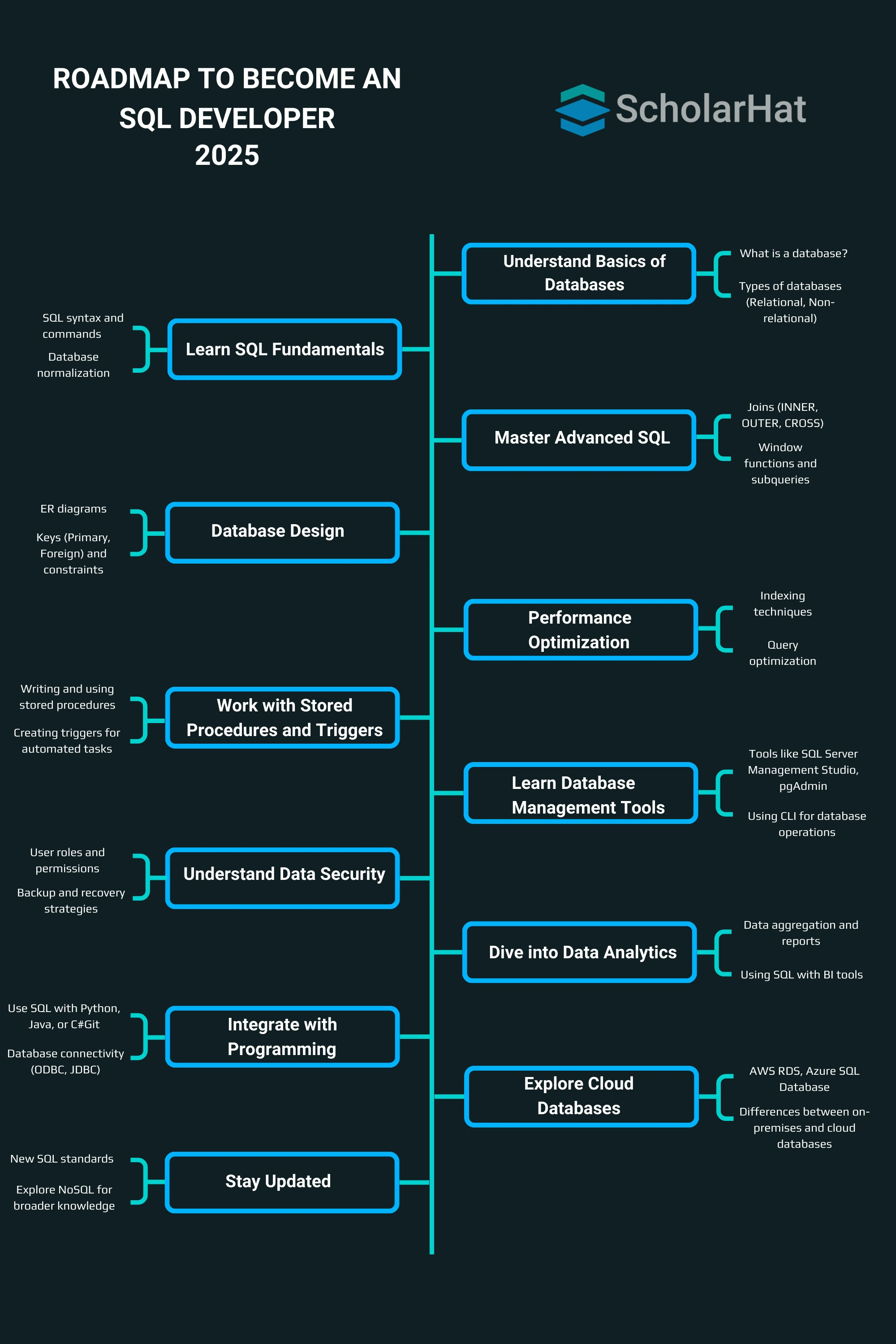
Job Titles Similar to SQL Developer
While exploring opportunities in the field of SQL development, you may come across several job titles that require similar skills and expertise. Here are some common job titles and their average annual base salaries, along with approximate values in Indian Rupees (INR).
- SQL Server Developer: $95,482 (around ₹78,70,000)
- Oracle Database Administrator (DBA): $105,719 (around ₹87,20,000)
- Oracle Developer: $95,619 (around ₹78,80,000)
- Oracle PL/SQL Developer: $96,087 (around ₹79,20,000)
- DBA Developer: $120,468 (around ₹99,40,000)
Note: These figures are approximate and depend on factors such as experience level, location, and the organization offering the position. Salaries in India are based on the current exchange rate and may fluctuate.
Whether you choose to work as an SQL server developer or an Oracle DBA, you’ll need strong SQL skills, database management expertise, and a solid understanding of relational database systems to succeed in these roles.
Summary
This article covered the essential technical and soft skills for SQL developers. From mastering core SQL techniques like query optimization and complex joins to developing soft skills such as problem-solving and communication, each skill plays a key role in ensuring your success. Whether you're just starting or looking to advance your career, these skills are necessary to excel as an SQL developer.
By 2026, 70% of developer jobs will demand full-stack .NET skills. Stay ahead—enroll in our .NET full stack developer course and dominate the tech market!
FAQs
Take our Sqlserver skill challenge to evaluate yourself!

In less than 5 minutes, with our skill challenge, you can identify your knowledge gaps and strengths in a given skill.

